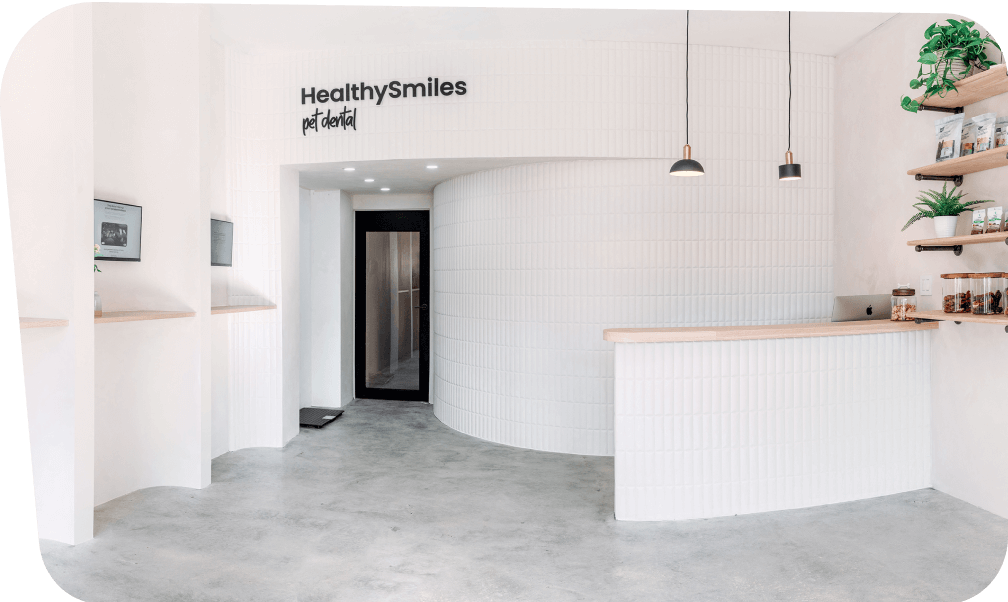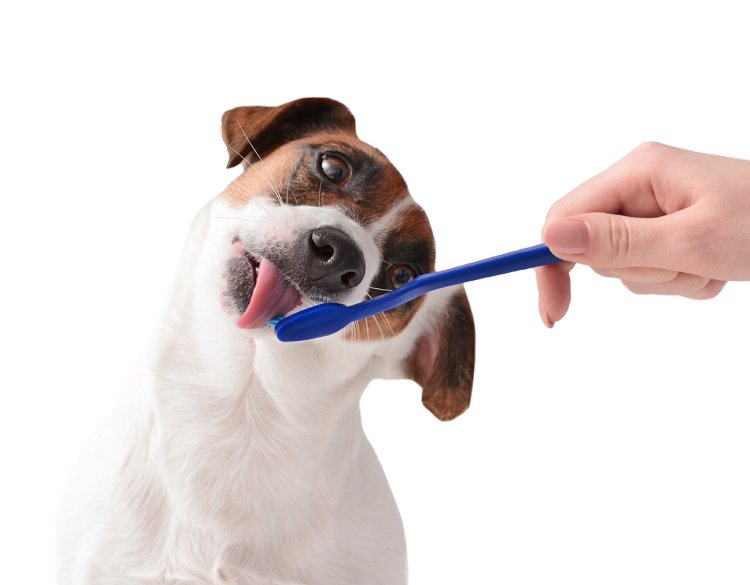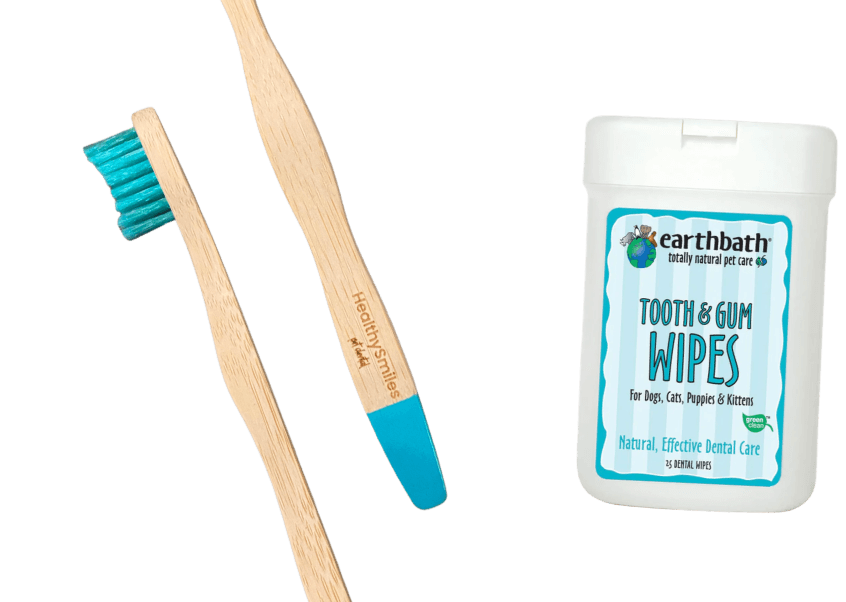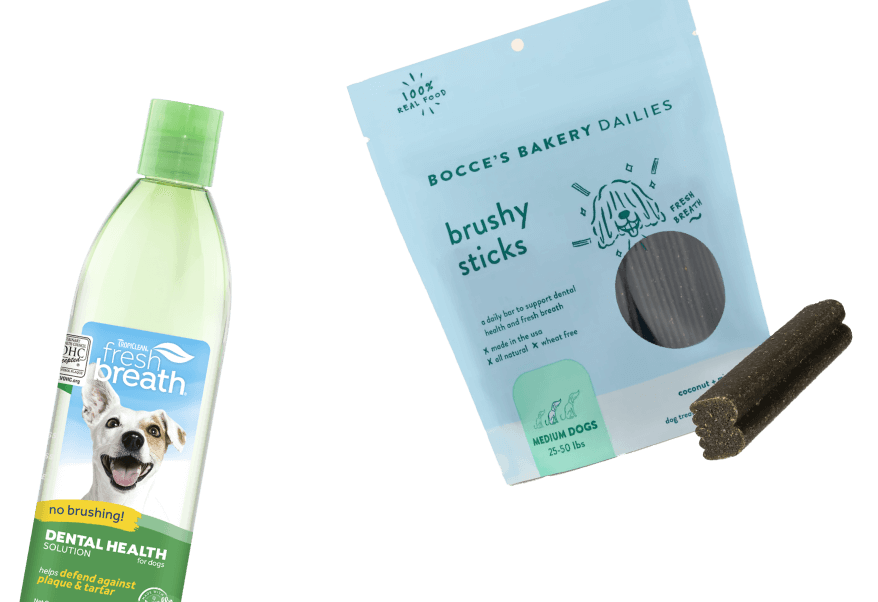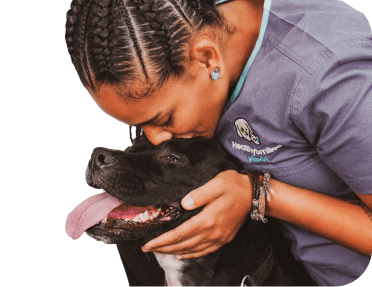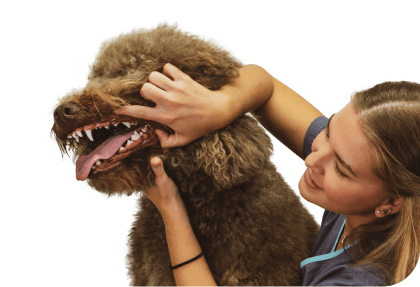A Pet’s Medical History is Key to Successful Dental Cleanings
March 22, 2021Pets’ medical history dictates if they are good candidates for non-anesthetic dental cleanings
Pet parents often wonder if their senior dog is a good candidate or whether or not their dog with kidney issues can be scheduled for a non-anesthetic dental cleaning.
At HealthySmiles, we ask pet parents for a comprehensive medical record of their pets, including their dental history, medical history, and behavioral conditions. This helps us modify the technique we use with each pet during their dental cleaning.
The medical history helps us modify the technique we use with each pet during their dental cleaning.
Table of contents
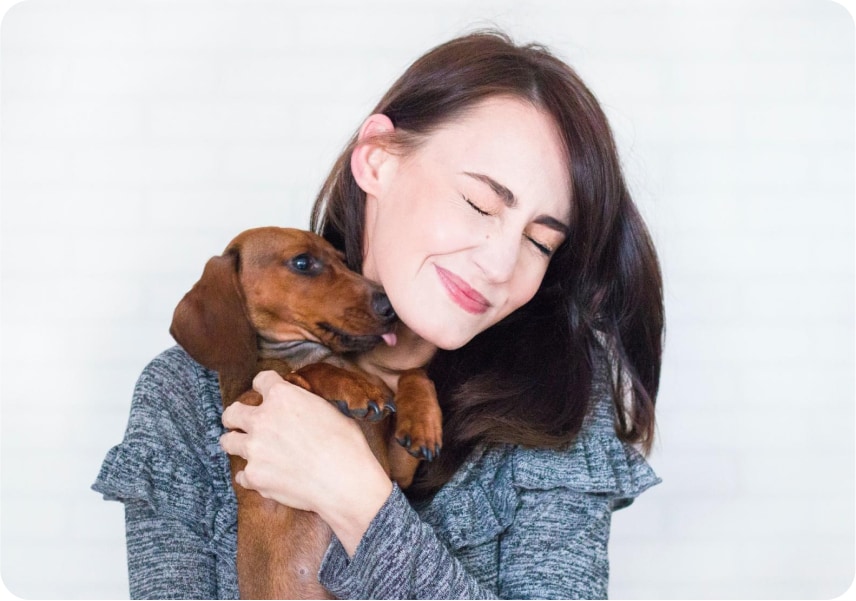
Gender, breed, and age are essential
A pet’s gender, breed, and age are necessary so we can understand what life stage the pet is at before determining a treatment plan. We use special calming techniques with a senior pet or smaller breed.
- If a dog or cat has a history of seizures and cannot stay calm or relaxed during a dental cleaning, the pet may be declined. Anxiety can be a trigger for seizures.
- If your dog or cat is experiencing pain, we will decline him/she.
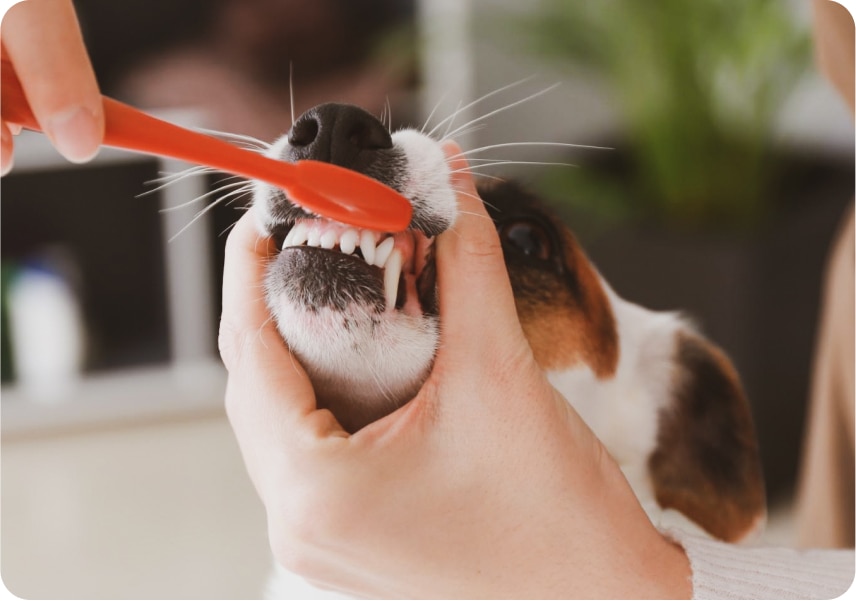
The dental history provides valuable insight
Knowing about teeth extractions and when the pet’s last dental cleaning took place can help determine how our dental experts will approach a non-anesthetic dental cleaning.
- For example, dogs categorized as having advanced periodontitis (level 4), where severe bone loss can happen, is a reason for why our staff can decline a pet.
- Under these circumstances, non-anesthetic dental cleanings might cause a post-dental infection.
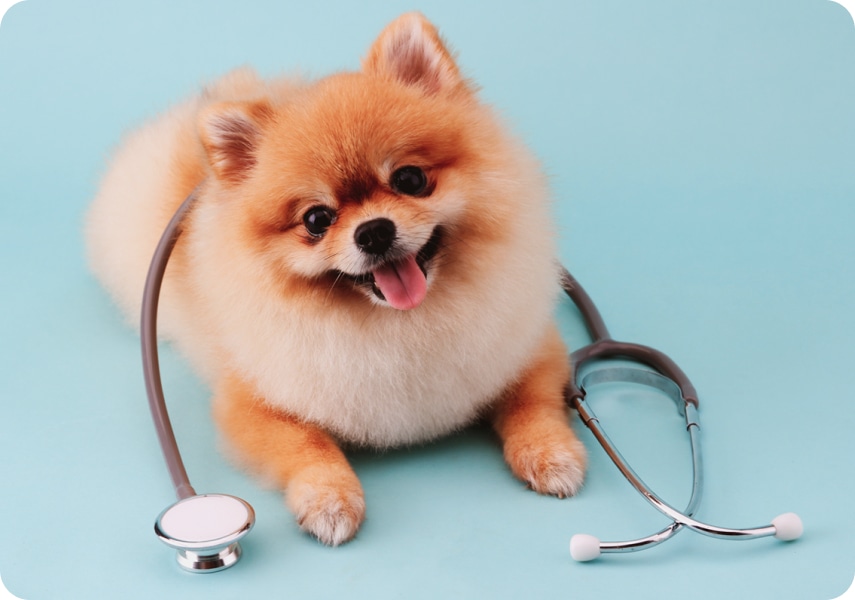
The medical history uncovers possible risks
Our dental experts need to know if a pet is suffering from heart disease, respiratory conditions, and autoimmune disorders.
One example is that we often find senior dogs with arthritis, and sometimes heart or kidney disease need special treatment. We have dental cleaning plans that address most of the health conditions we may learn about in the medical form.
If we understand what these potential risks are, then we will be informed to decline pets whenever is necessary.
10 health issues pet parents must disclose
 Heart Disease
Heart Disease
Heart disease can impact how dogs and cats breathe, and they may have a cough. Some dental cleaning positions may worsen this cough.
- Heart conditions may include diseases like congestive heart failure and symptoms, including a heart murmur.
- We ask how long the pet has been treated and when a vet diagnosed the condition. This will impact the techniques we prefer to use and whether the pet is a good candidate.
 Respiratory
Respiratory
The position used for non-anesthetic dental cleanings may make respiratory issues worse because the pet will by lying down on their back or side during the procedure.
- We give dogs with respiratory issues breaks every 10 to 15-minutes during the dental. The dog can walk around and relax for five minutes, and then we continue the dental cleaning giving similar breaks, so we never exhaust the pet, and it remains a positive experience.
- Any client that has a pet that has been diagnosed with a respiratory condition known as ‘collapsing trachea’ is given the breaks mentioned above.
- Tracheal collapse in dogs is characterized by the weakening of the trachea’s cartilaginous rings. The pet would need to stay still and calm while being restrained for their cleaning.
 Internal organs
Internal organs
If a pet has a liver or kidney issue they will likely be on medication and may also be dehydrated. Both of these organs serve as filters for the body.
- Typically these pets don’t feel very well. They’re on a new diet in some cases and they may also be a senior pet.
- Our dental experts will adapt the cleaning approach so the dog or cat feels comfortable during the procedure since they’ll likely need breaks.
 Neurological
Neurological
Stress often causes an epileptic dog to have a seizure so our dental experts use special calming techniques if a pet has this condition.
If a dog or cat has epilepsy and cannot stay calm or relaxed during the dental cleaning, they’ll be declined.
Typically, headlamps are used during the dental cleaning and bright lights are also known to cause seizures. Our experts never use headlamps in this case and are careful with these types of neurological conditions.
 Orthopedic
Orthopedic
-
Back or neck pain
Many health issues can cause chronic and acute neck and back pain in animals. Many diseases, including cancer, spinal trauma, referred kidney pain, and soft tissue injuries, can cause neck and back issues. The position the animal is in during the procedure can worsen these symptoms.
Dogs and cats with these conditions are not good candidates for non-anesthetic dental cleanings and will most likely be declined for their safety.
-
Arthritis or hip pain
If your senior pet has a health condition like joint issues, hip pain, or arthritis, a non-anesthetic dental may be too risky as the physical position the pet is in could worsen their condition.
-
Sensitive areas
These may be the result of trauma from previous surgeries, or areas where the dog doesn’t want to be touched. For example, a lot of dogs dislike their paws to be touched, so when we swaddle them for a dental cleaning we avoid this area.
-
Old injury, fracture, luxating patella
We always advise pet parents to wait until an old injury or fracture is fully healed before we schedule a dental cleaning. This is usually about three to four months after the onset of the injury. A dental cleaning may make an old injury worse.
 Surgeries
Surgeries
Pets need time to recover from surgery. The type of surgery will dictate when a dental cleaning booking can be set up for your dog or cat.
 Pregnancy
Pregnancy
Dogs are pregnant for approximately 63 days or about two months. Pregnancy can be extremely stressful on dogs. A non-anesthetic dental cleaning may create more stress on their body which could result in a miscarriage or further complications.
- We recommend the pet owner wait until the puppies are two months old and the female is no longer feeding her litter.
 Endocrine
Endocrine
Common endocrine disorders include diabetes, Addison’s disease and Cushing’s disease. These are all very serious conditions and uncontrolled diabetes can lead to devastating effects on a dog’s body.
- Our dental experts won’t decline a pet if they’re being properly treated for diabetes but will create a special treatment plan for them.
- Cushing’s disease will cause high levels of cortisol in a dog’s body and stress inherently increases this side effect. We have to be very careful with dogs that have this disease and we’ll plan breaks throughout the procedure to ensure the dental cleaning isn’t stressful.
- Addison’s disease is known as hypoadrenocorticism. This is when the adrenal glands are underproducing steroids. In extreme cases, a dog may even collapse which is termed an Addisonian crisis. We’ll discuss the treatment plan with pet parents if their dog is diagnosed with this disorder.
 Autoimmune disorders
Autoimmune disorders
Common diseases include Hemolytic Anemia, Thrombocytopenia, and blood disorders that prevent a dog from coagulating their blood normally.
- During a non-anesthetic dental cleaning our experts work in the dog’s gum line and this may cause bleeding.
- Many pets with an autoimmune disorder are declined and we typically refer them to their vet for a procedure that includes general anesthesia.
 Senses
Senses
Our dental experts need to know if a dog is blind or deaf as they are both hypersensitive to movement.
- During the procedure we’ll move very slowly.
- If the pet owners have training tips we’ll make sure to use hand signals and cues they’re accustomed to throughout the procedure.
Behavioral issues pet parents must disclose
Some of these behavioral conditions listed may result in a decline as the pet may not be a good candidate for non-anesthetic dental cleanings.
Aggressive behavior
People aggressive
Pet parents must disclose if their dog has ever been aggressive towards anyone including a veterinarian, vet technician, or groomer.
- If something has triggered your dog previously then this should be reflected on the form with notes.
- If your pet has a bite history that must also be reflected on the medical record.
Dog and cat aggressive
Dogs that are reactive overreact to certain stimuli or situations. Some dogs are reactive when they see other dogs and in some cases cats.
- This behavior may impact an appointment if the pet parent must enter a clinic setting.
- This may or may not be relevant if the appointment is at the pet parent’s home.
Cage shy aggressive
Some dogs don’t have a lot of experience being crated and if they have a history of barrier frustration this may impact the environment of the cleaning.
- A calm environment where no other animals are present would be ideal so the dog doesn’t need to be crated.
Needs to be restrained
Some dogs are muzzle trained for veterinary procedures and should be restrained.
- Pending the history of the dog, pet parents can work with our dental experts on the level of restraint needed or the dog may be declined.
Timid behavior
Head shy
Dogs quickly learn to associate a hand reaching toward their head with discomfort or stress.
- Dogs that are head shy, learn to duck out of the way of a hand reaching toward them.
- They are typically very uncomfortable when someone reaches towards their head.
Fear biter
Dogs that react with a bite when they’re scared are classified as ‘fear biters’ and this behavior may put our dental experts in harm’s way.
- Understanding the history of this behavior will allow for a discussion between the pet parent and our staff before scheduling the appointment.







